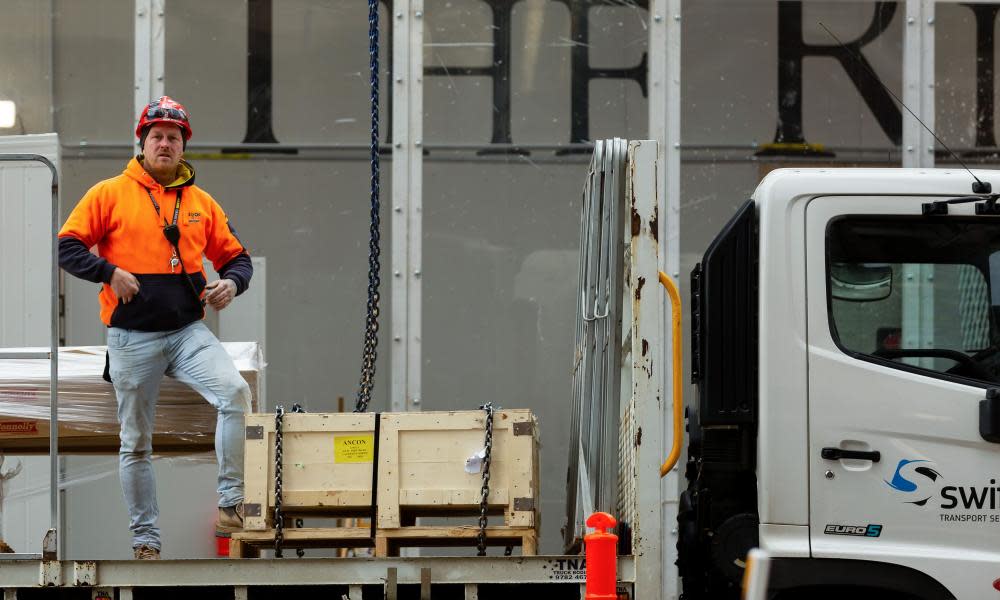Victoria's stage four restrictions will limit ability to deliver infrastructure projects, experts warn

Infrastructure projects in Victoria could become a lower priority because stage four restrictions and capacity constraints will limit the ability to deliver them, the chief executive of Infrastructure Australia has warned.
Romilly Madew made the comments ahead of the release on Wednesday of Infrastructure Australia’s mid-year priority update, which adds 12 new projects and initiatives to a list of 155 nationally significant proposals worth more than $64bn.
Infrastructure Australia is on the lookout for proposals from states and territories than can be fast-tracked as part of economic recovery from the Covid-19 recession.
Before the pandemic, the Council of Australian Governments had asked Infrastructure Australia to assess capacity constraints when construction was at an all-time high – but now the emphasis has shifted to understanding how Covid-19 has impacted supply chains and the execution of projects.
Related: Victoria's Covid industry shutdown to throw one in seven of its workers out of employment
“You only have to see with stage four restrictions in Victoria projects will be slowed down, because the [number] of people that can come on to projects [is restricted],” Madew said.
“We’ll have to take this into consideration in planning, the design and selection of projects … in coming years because we actually have to be able to deliver them.”
Stage four restrictions in Victoria will cut private construction projects to 25% of their normal workforce. The workforce of government projects has already halved and will be further reduced on a case-by-case basis.
Infrastructure Australia is meeting states and territories fortnightly to discuss “live issues” including freight, contracting and skills constraints, Madew said, with jurisdictions set to “refresh their pipelines all the time” to reflect capacity.
Peter Colacino, chief of policy and research, said Infrastructure Australia would have to take “short- and long-term impacts” of Covid-19 into account because the pandemic had affected behaviour – such as increasing working from home – but in some jurisdictions, like New Zealand, economic activity was recovering.
Robin Jackson, chief of infrastructure prioritisation, said Infrastructure Australia was “conscious of keeping the pipeline full” to aid economic recovery.
The update – which was drawn up based on submissions made before the Covid-19 pandemic – adds five new road proposals, three for rail, two for freight and one public transport project across New South Wales, Queensland and Western Australia.
These include:
In NSW: the M12, a 16km motorway linking Badgerys Creek airport to south-west Sydney, listed as a high priority; more train services from Sydney to the south coast, and the Port Botany rail line duplication and Cabramatta passing loop – both priorities.
In Queensland: regional road network safety improvements and Brisbane northern suburbs corridor capacity, listed as high priorities; and Browns Plains to south-east busway public transport connectivity, inland freight route capacity and safety, Browns Plains to Beaudesert road capacity and safety and Mooloolah River interchange capacity – all priorities.
In Western Australia: the Metronet Morley–Ellenbrook line and high capacity signalling – both priorities.
The NSW and Western Australian projects have fully developed business cases, whereas the Queensland proposals are “initiatives” that Infrastructure Australia determined “have the potential to address a nationally significant problem or opportunity” but still require further development and rigorous assessment.
The update also lists the modernisation of the Australian Institute of Sport in Canberra as an important piece of “social infrastructure” that should be modernised as a priority initiative.
Related: Pandemic leave is just Victoria's hardship payments rebadged, Labor says
Madew said the emphasis had shifted from supporting population growth to the stimulatory impact of projects and job creation.
She noted that four of the 15 projects that Scott Morrison announced would be fast-tracked after national cabinet agreement on 24 July came from Infrastructure Australia’s priority list, including inland rail, the Marinus link and emergency town water projects in NSW.
“Australia is planning its recovery from a rolling series of crises: drought, flood, the bushfires and now Covid-19,” she said.
“As we look forward, the focus is on delivery and as the nation’s infrastructure advisory body, we are continuing to improve our ability to move quickly to identify investments that will improve productivity – this is about expanding the pipeline, keeping the economy growing, helping to create jobs and attract investment.”

 Yahoo News
Yahoo News 
